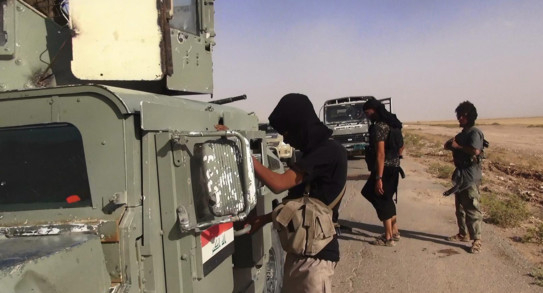
In a dramatic change of policy, US President Barack Obama has authorised the aerial bombing of Islamic State of Iraq and the Levant (Isil) targets in northern Iraq. The decision was prompted by the unexpected incursion last week of Isil fighters into Iraqi Kurdistan territory. The White House has said that this will be a lengthy mission; a long-term project, and will not involve US ground forces. The mission will also respond to humanitarian needs of Iraq’s religious and ethnic minorities who have been attacked by Isil and forced to flee to Kurdistan. The US effort is linked to the Iraqis agreeing to form an inclusive and united government soon, something which outgoing Iraqi Prime Minister Nouri Al Maliki has been resisting.
It’s been more than three months since extremists belonging to the Isil took over Iraq’s second largest city of Mosul and most Sunni dominated provinces in the north of the country. Initially aided by Sunni insurgents, rebelling against the government of Al Maliki, Isil quickly solidified their control over a wide region extending from Syria’s northeast to Iraq’s north and east. The enigmatic leader of Isil, Abu Bakr Al Baghdadi, soon installed himself as caliph over his new realm, enforcing a puritanical form of Sharia that considers all those who oppose him as apostates.
Isil, which appeared on the scene in Syria in the past three years, is today one of the most formidable militant forces on the ground. It has access to heavy weapons, vehicles and even tanks that were captured from the fleeing Iraqi army. In Syria it took over “liberated” areas from the Free Syrian Army (FSA) and Al Qaida linked Jabhat Al Nusra. Only recently it has turned its attention to the regular Syrian army in northeastern Syria; overtaking important military strongholds.
The rise of Isil has been astounding. Very little information on this extremist organisation exists. In Syria it is estimated that it has over 15,000 members, the majority are foreign jihadists. Many questions have been raised about its dubious links to the Syrian regime, but there are indications that until recently it had enjoyed the support of some countries in region as well. Today it is considered an enemy to all; a dangerous player in the Syrian and Iraqi crises. But its ideological influence extends beyond these countries with supporters and sympathisers found among Salafist jihadists in Lebanon, Jordan and Palestine as well.
Today the threat of Isil extends all the way to northern Africa. The recent victories of the extremist movement have driven members of the FSA and Jabhat Al Nusra to pledge allegiance to Al Baghdadi and his organisation, despite appalling atrocities committed in areas under its control. In Mosul and northern Iraq Isil has forced Christians and other religious minorities to abandon their homes and seek refuge in neighbouring Iraqi Kurdistan. Hundreds of thousands have fled in the worse religious and ethnic cleansing campaigns the region has witnessed in centuries. Churches and even Muslim shrines have been blown up by Isil whose distorted form of Islam has been condemned by Sunni clerics and spiritual leaders.
Last week members of the notorious organization overtook the border town of Arsal in eastern Lebanon, killing, wounding and taking hostage dozens of Lebanese army soldiers and officers. Eventually they were talked into withdrawing back to Syria, but there are no guarantees that Isil fighters will not return. The incident coincided with similar incursions into Iraqi Kurdistan, prompting the government there to declare a state of emergency and calling on volunteers to join the peshmerga to repulse the invaders.
Jordan too is feeling the pressure after members of Salafist jihadists in Zerqa and Maan, two of their main strongholds, pledged allegiance to Al Baghdadi. The Salafist jihadist movement in Jordan is divided especially after the spiritual leader of the movement, Abu Mohammad Al Maqdasi, called on his followers not to support Isil. His call was rebuffed by some members who demonstrated in both towns brandishing the now familiar black and white flag of the organisation.
Official reaction in the Arab world to the sudden expansion of Isil in Iraq and Syria has been muted. Only the Saudi monarch King Abdullah Bin Abdul Aziz made a strong statement attacking the organisation and accusing it of hijacking Islam. Much more needs to be done. The Europeans, many of their subjects are thought to have joined Isil, are calling for swift action against a new form of terrorism. The US decision to intervene is now a game changer.
Dealing with Isil will prove to be a complicated issue since the organisation’s activities intersect with the crises in both Iraq and Syria. The West has resisted getting involved militarily in Syria, allowing the regime of Bashar Al Assad to ruthlessly punish his own people. In Iraq, Al Maliki is trying to cling to power even when the coalition of Shiite parties and powers have abandoned him. Even Iran, his once staunch ally, now believes he should be replaced.
But the West and the Arabs can adopt immediate measures to support the ill-equipped Lebanese army. Iraq’s Kurdistan has asked for US military help and Washington has responded. The expansion of the Isil must be checked now before more territory is lost. It will require an unprecedented cooperation between regional and international powers to confront this new danger. Dealing with its ideology, which seems to attract young and disillusioned Muslims, will prove more important. This is the real menace whose long-term effects must be addressed today.
Osama Al Sharif is a journalist and political commentator based in Amman.










